Choosing the best time to visit South Africa can be overwhelming. Especially since each season has its own set of draws (and drawbacks). We’re breaking down exactly what to expect in each season so that you can choose the best time of year to visit based on your travel style and interests.
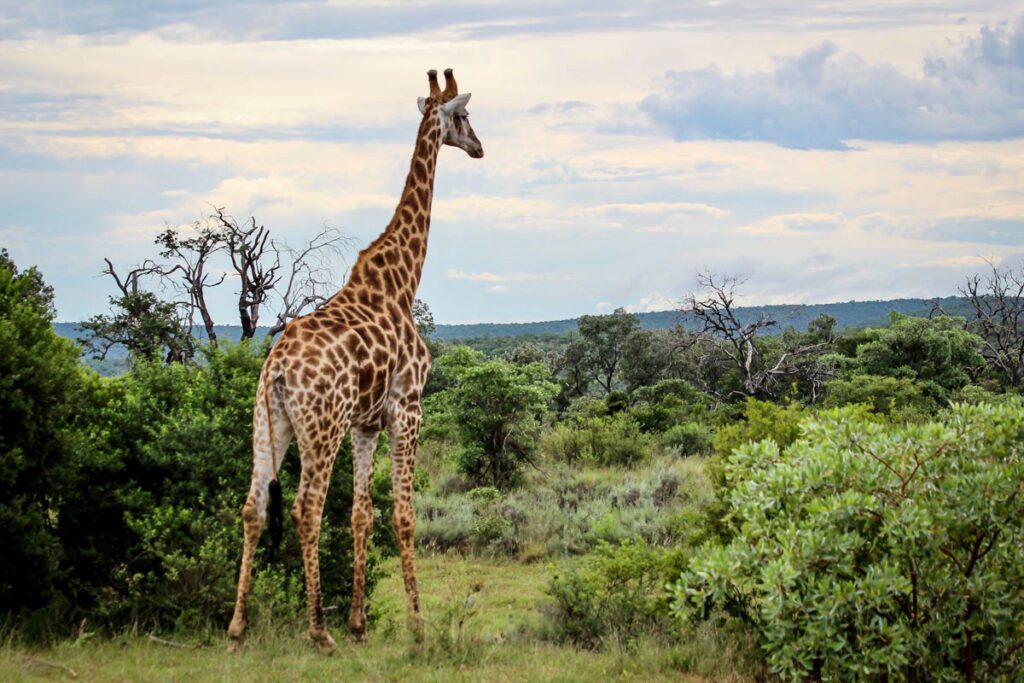
Bursting at the seams with world-class wine, game reserves, surf breaks, and cosmopolitan cities like Cape Town, South Africa has something for any kind of traveler, no matter the season.
This lively country is set in the southern hemisphere, so each of its four distinct seasons are a complete opposite of the north. This means that when everyone in the north has snow days and hot coco, South Africans are taking to the beaches and enjoying hot summer days.
The first step in figuring out the best time to visit South Africa is choosing exactly what season is best for your trip.
Many different factors come into play since many South Africa itineraries include a variety of these activities.
So this begs the question:
When is the best time to visit South Africa?
In short, the best time to visit South Africa is during the shoulder seasons. You can expect favorable, dry weather and fewer crowds during April, May, and September through November.
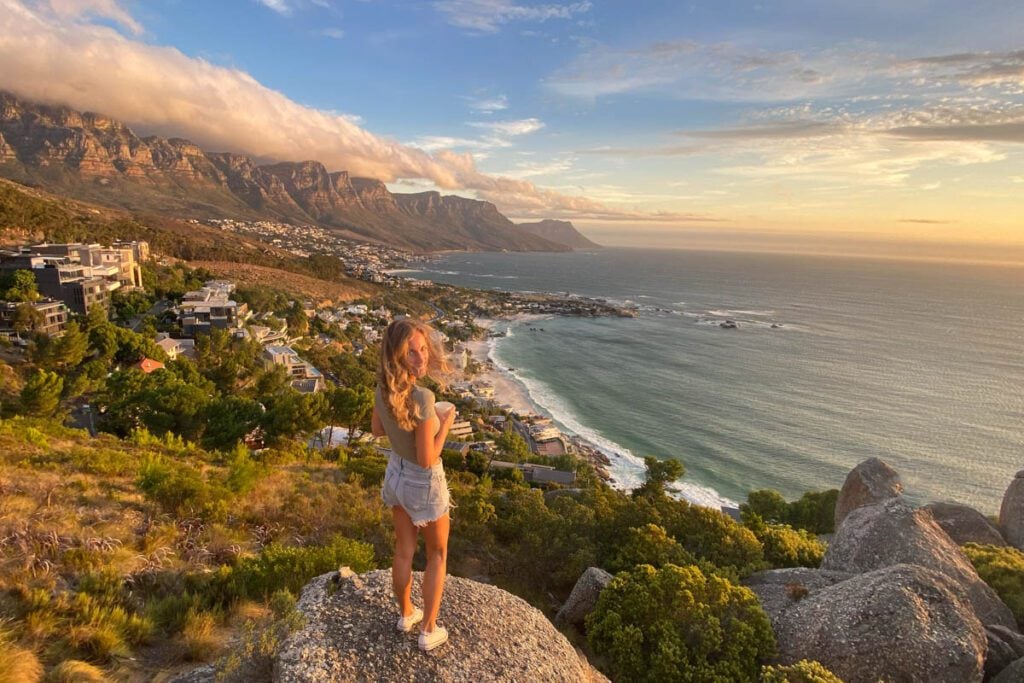
Spring is a season to be reckoned with as the weather is nearly perfect and peak for whale watching season.
Summer brings ideal beach weather and exciting festival lineups.
Fall welcomes AfrikaBurn and prime wine harvesting.
Winter boasts the best weather for game drives on safari and world-class surfing competitions.
Truth be told, there is no correct answer. What you plan to do and where you want to go play a large part.
But fear not, we’re here to give you the low-down on each season so you can choose the best time to visit South Africa for YOU.
Answer these questions to get started:
- What region of the country do you plan to visit?
- Are you easily bothered by crowds?
- Are you planning to go on safari in South Africa?
- Do you prefer to spend your time outdoors at the beach or exploring a new city?
- Are you planning to do activities like whale watching, scuba diving or surfing?
Thinking about your answers to these questions is going to help you start to determine when to visit South Africa.
Article contents
- Our experience in South Africa
- South Africa geography overview
- Weather in South Africa
- Summer in South Africa
- Fall in South Africa
- Winter in South Africa
- Spring in South Africa
Overall BEST time to visit South Africa
Want a quick recommendation? Jump down to see our personal advice for the best time to visit South Africa. Plus, we’ll share what times of year we’d avoid visiting!
Our experience traveling in South Africa
Amanda has visited South Africa in during all the months from November through March
Her experience:
- My first visit to South Africa was to Cape Town and on Safari at Pilanesberg Game Reserve in November (2008)
- From January – March (2019) I spent time in Johannesburg, on safari, the Cape Winelands and based in Cape Town
- I came back in December – March (2020-21) and went on safari at Welgevonden Game Reserve, based in Cape Town and also drove the Garden Route
- In 2021-22 I returned from December through February to base myself in Cape Town once again (are you picking up on a theme here yet!?)
Spring in South Africa
(fall in the northern hemisphere)
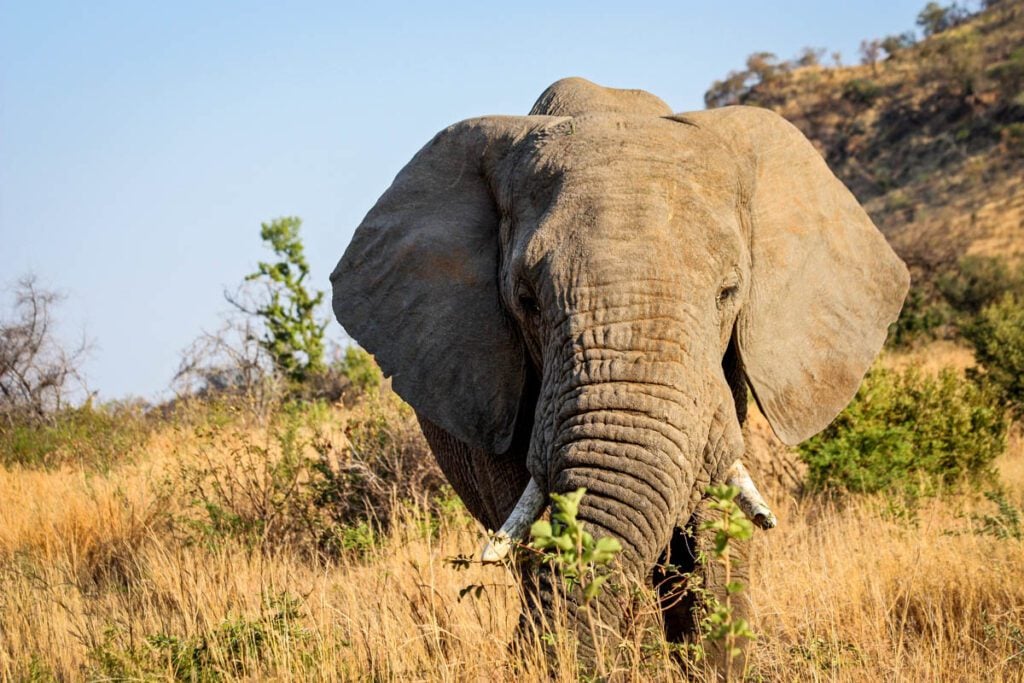
I (Amanda) first traveled to South Africa in November 2008. This is springtime in the southern hemisphere and the weather was great! It was a bit chilly (still long pants and a jacket needed), and got cooler at night. But overall the weather was pleasant, if not a bit windy in the Western Cape.
Would we recommend visiting during spring?
Absolutely! South Africa is beautiful during September- November. The only caveat is the winds pick up during this time in Cape Town (November is typically the windiest month).
Summer in South Africa
(winter in the northern hemisphere)
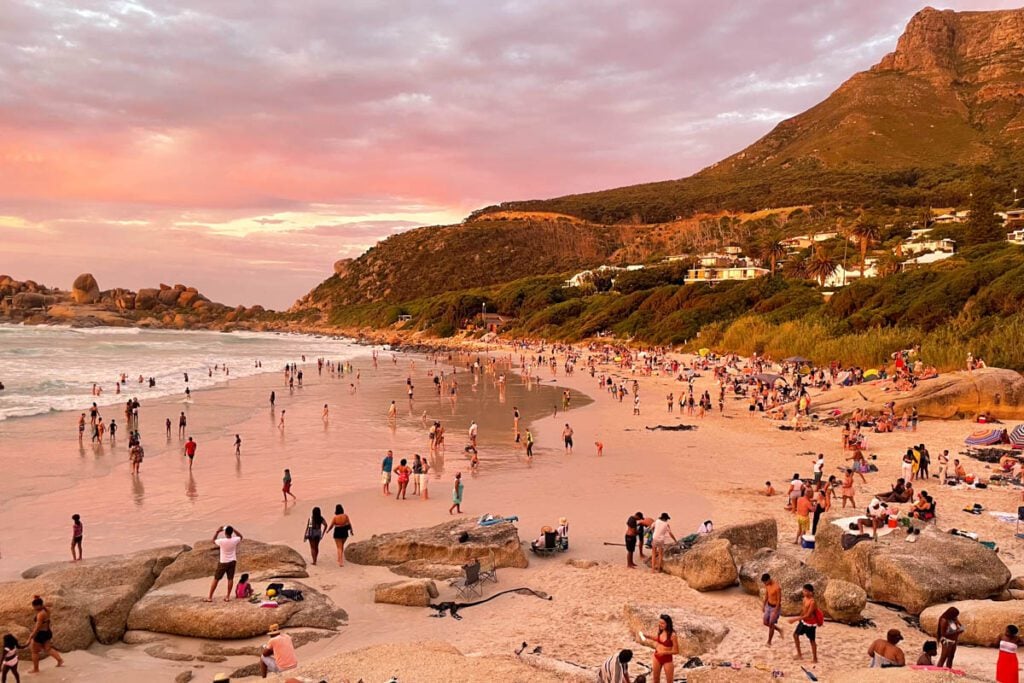
I’ve spent a lot of time in South Africa in recent years during the summer months. There is truly nothing better than escaping winter in the north for the southern hemisphere summer.
Cape Town is alive and buzzing with summertime energy! All of the markets are open, and there are tons of summer-only events and festivals happening all over the country.
Would we recommend visiting during summer?
Absolutely! If you are planning a trip to South Africa, summertime is the time to go! Especially if Cape Town is on your itinerary.
Fall in South Africa
(spring in the northern hemisphere)
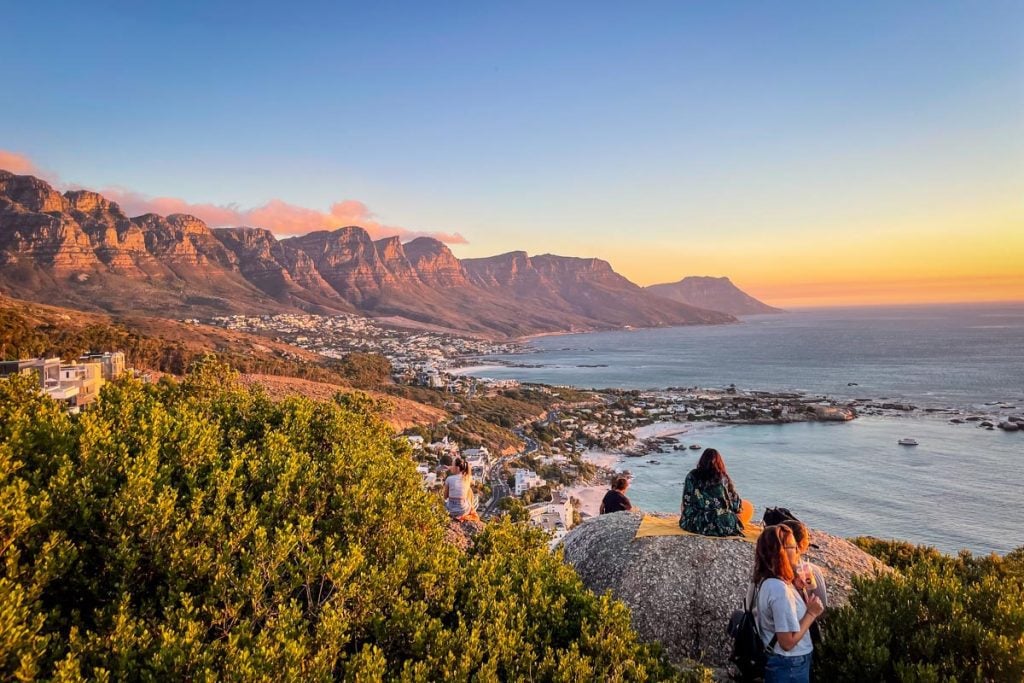
I’ve stayed in Cape Town until early fall a few times and found the experience to be really enjoyable. The peak tourism/vacation season in Cape Town is typically winding down after February, and March-April can have some of the best weather.
Prices on accommodation and other things will drop off a bit after peak season and the crowds will begin to thin once more making it easier to enjoy popular destinations.
Would we recommend visiting during fall?
Yes! In fact, staying in South Africa further into the fall is my intention for next year and I am really looking forward to a change of pace with less crowds. Plus, I’m told the weather stays optimal all the way until late-May.
South Africa geography overview
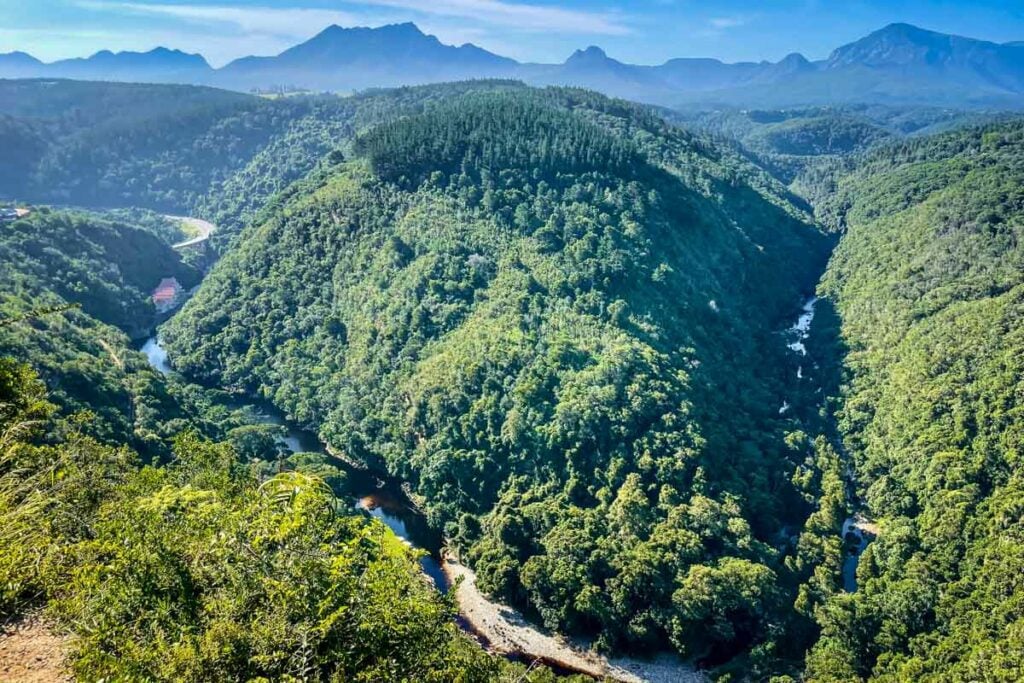
South Africa stretches 2,798 km (1,739 miles) across the entire southern tip of the African continent from its desert border with Namibia and the Atlantic Ocean in the west, to its border with Mozambique hugging the Indian Ocean in the east.
It has two distinct geographical regions: the narrow coastal zone and interior plateau.
Apart from these two key zones, there are eight different biomes spread across the entire country bursting with vibrant plants, wildlife, and spectacular biodiversity.
With so many of these individual ecosystems and terrains, each month of the year gives one, or many, of these areas a chance to shine.
Which is why pinpointing an exact best time to visit South Africa can be so challenging.
For this article, we’ll be focusing on the weather in the mainland coastal zones and interior plateaus, since there is continuity throughout each region and it can give you a good grasp of what to expect weather-wise.
Weather in South Africa
South Africa’s climate is best described as semi-arid and subtropical with weather that’s comparable to that of Southern California.
Divided into two regions, the coast and plateau, each area has opposite rainfall than the other. So when it’s dry in the bush, you can expect it to be wet along the coastlines, and vice versa.
Cape Town & the coasts
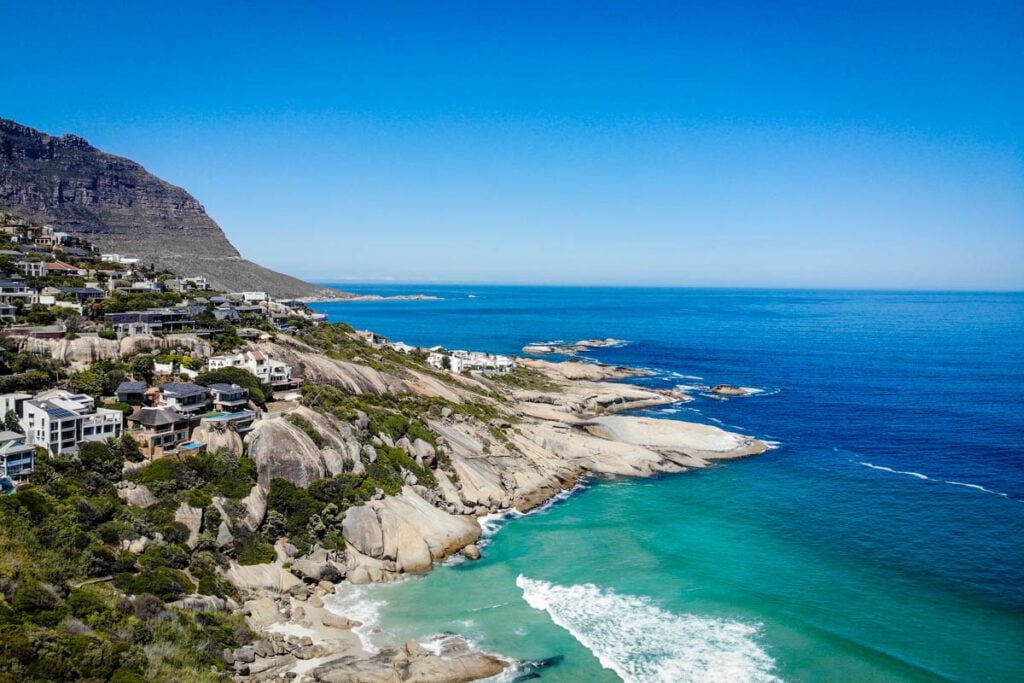
The entire coast of South Africa is influenced by both the cool fronts from the Atlantic Ocean and the warm fronts from the Indian Ocean.
The east coast tends to be wetter and cooler than the west, but each still shares the same yearlong weather patterns.
The coasts experience the most amount of rain during the winter from May to September. Expect daytime temperatures ranging from 4°C/40°F to 17°C/60°F.
From October to April, Cape Town and surrounding areas reach peak weather with sunny, hot, and mostly dry days. Daytime temperatures fluctuate from 24°C/70°F to 30°C/90°F during the peak of summer.
Good to know: If you’re planning on driving the Garden Route, note that it’s in an “in-between” area with a moderate amount of rainfall throughout the year.
Kruger National Park & the plateau
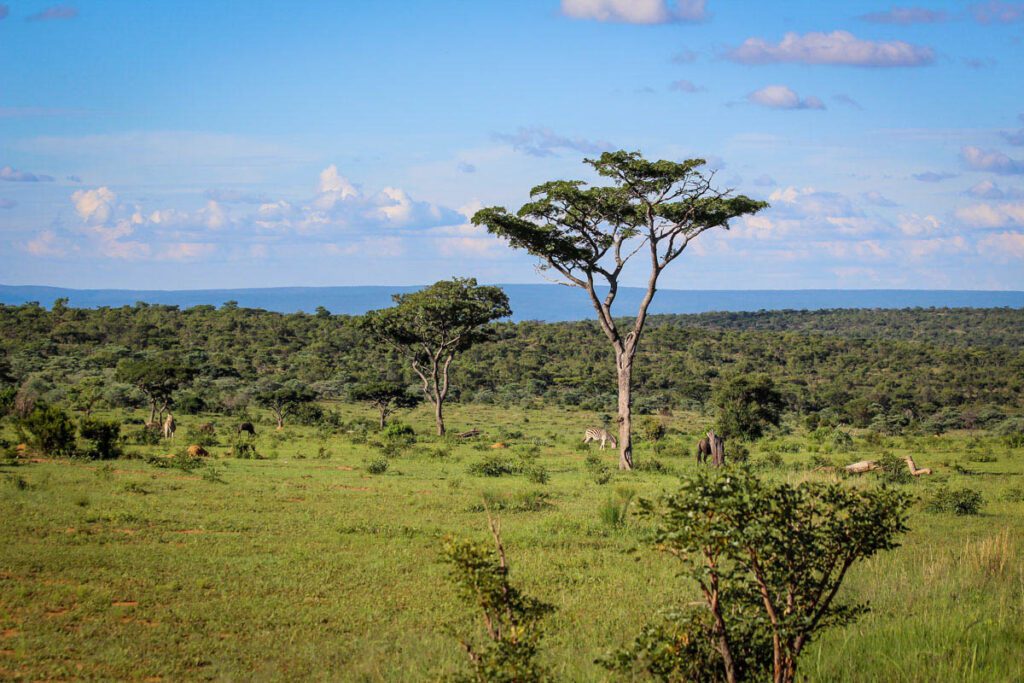
Within Kruger National Park and other reserves in the bush, you can expect similar temperatures around the region since they all lie on the Central Plateau.
Expect little to no rainfall during the winter months from May to September. The mornings can get quite chilly, 10°C/50°F, and the afternoon temperatures are ideal for spotting The Big 5, 27°C/80°F.
From April to October, temperatures and humidity increase dramatically in the bush and can get unbearably hot, plus afternoon downpours are not uncommon. Peak summer reaches temperatures of 30°C/90°F with brutal humidity.
Below you’ll find a break down of the wet & dry season months in each region:
Stats on South African weather & seasons:
- Warmest month(s) in South Africa: December – February
- Coldest month(s) in South Africa: June – August
- Rainiest month(s) in South Africa: December, January, February (Kruger NP & reserves); June, July, August (Cape Town)
- Driest month(s) in South Africa: June, July, August (Kruger NP & reserves); December, January, February (Cape Town)
- Most crowded month(s) in South Africa: December & January (Cape Town); July (Kruger NP & reserves)
- Least crowded month in South Africa: May
Summer in South Africa
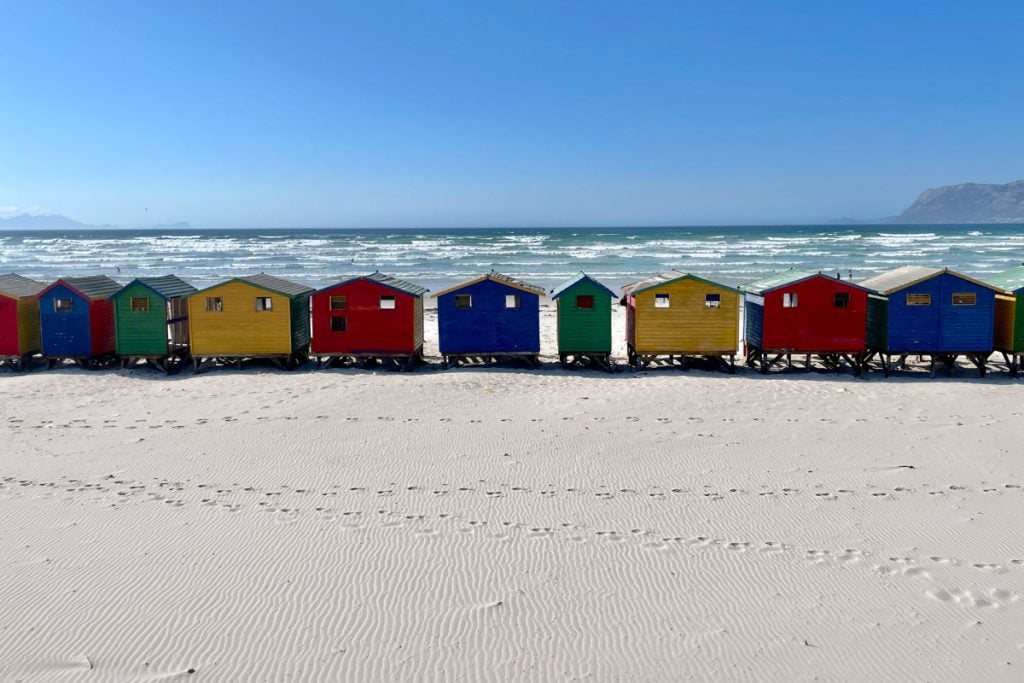
The long summers in South Africa sweep hot and tropical weather throughout a majority of the country, welcoming the peak tourist season.
December and January get really busy since many local and school holidays happen during these months, so you’ll want to make bookings months in advance.
- Kruger & reserves: 32°C/90°F averages with even higher peak temperatures; wettest months with torrential downpours
- Cape Town & coasts: afternoons average 26°C/80°F with cooler mornings; mostly blue skies with occasional rain
Summer months at a glance:
December is the very start of summer with beautiful, sunny weather in the Cape and festivals popping up around the country. Aim for early December to avoid the rush of school vacations later in the month.
January is when most locals head to the coasts and National Parks for the summer holiday. The Western Cape is hot, dry, and perfect for exploring.
February is one of the hottest months in the Cape, bringing perfect beach weather and plenty of crowds. Be mindful of the heat and stay out of the sun during the hottest parts of the day.
March is the last of the summer months and has nice weather for hiking, walking, and beach-bumming as the country moves into fall. Kruger is just out of its rainy season, so the rivers will be raging.
Best places to visit during summer in South Africa
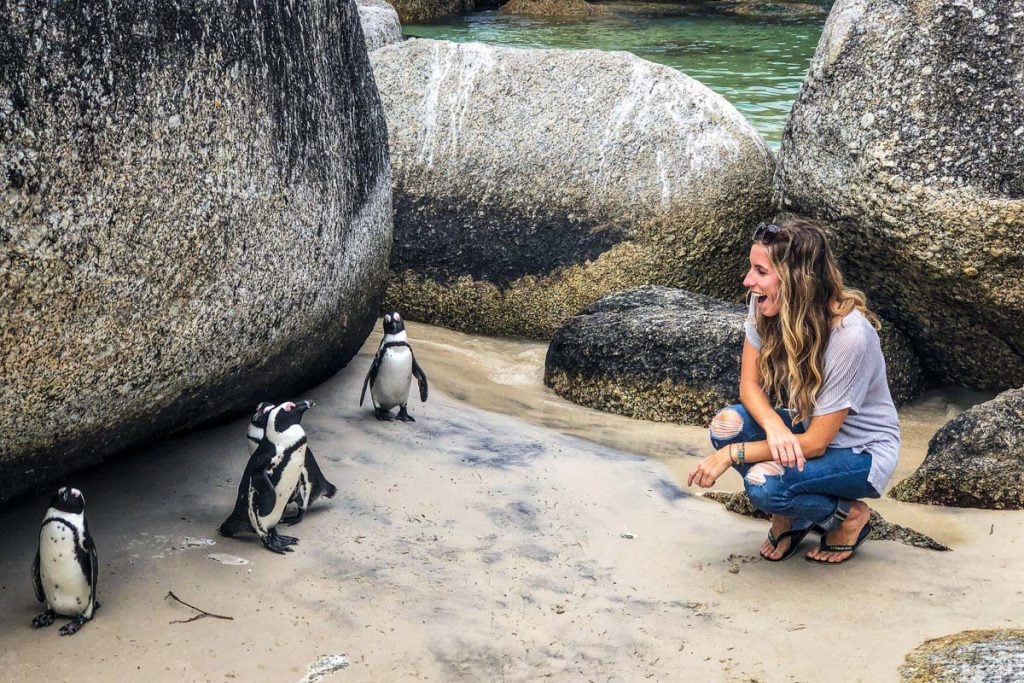
- Cape Town – summer vibes are strong here!
- Drakensberg Mountains – for hiking and backpacking
- iSimangaliso Wetland Park – loggerhead and leatherback turtle hatchlings
- Boulders Beach – to spot the iconic penguins
Best things to do during summer in South Africa
- Drive the Garden Route
- Head to the beach
- Attend a summer music festival – Up the Creek, Ultra Music Festival, We Love Summer
- Sunset at Lion’s Head
- Hike the Otter Trail
Summer is the best season to visit South Africa if…
- … you don’t mind crowds
- … you want to relax on the beach
- … you want to experience local festivals
- … you want plenty of sunshine and good weather
- … you don’t mind ‘less-than-optimal’ safari conditions
What to pack for summer in South Africa:
- bug repellant (consider DEET to ward away mosquitos that carry Malaria)
- activewear
- a light jacket or fleece
- rain jacket
- walking/hiking sandals
- Sun protection (reef safe sunscreen, hat, chapstick with SPF)
- Swimwear
- Quick-drying towel
Fall in South Africa
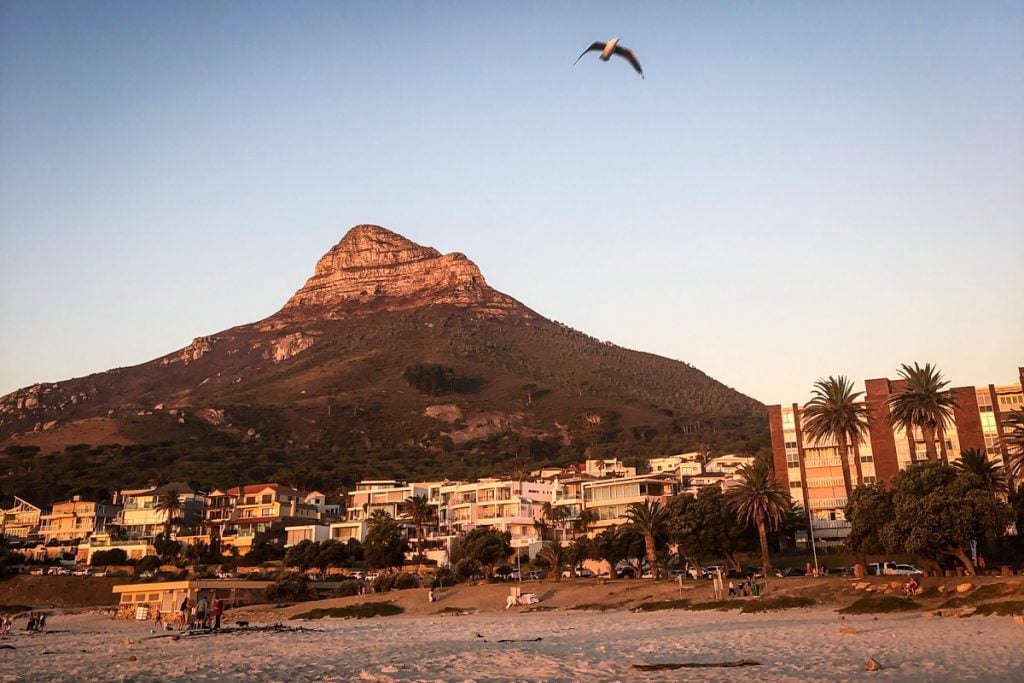
South Africa in the fall is warm, but not too hot and rainfall is minimal since it’s the shoulder season. This is the ideal time to visit for hiking, backpacking, and doing some real exploring in nature.
As the weather cools down, the summer crowds dwindle, so you can expect prices to be more affordable these months.
Afrika Burn, one of the largest festivals celebrated in the country, happens between May and June. The vineyards in the Cape Winelands are ripe for picking and the weather is perfect for sipping your way around this beautiful region.
- Kruger & reserves: Cooler mornings and nights, afternoon average of 26°C/80°F; rain dwindles and humidity drops
- Cape Town & coasts: 10°C/50°F average in the morning, 21°C/70°F in the afternoon; many nice days but rain/clouds increases
Fall months at a glance:
April brings cool weather across South Africa with summer crowds thinning out by the end of the month. It’s the perfect month to visit if you’re combining multiple regions in South Africa.
May starts to cool down as the country moves into winter. There may be snow in the highlands and the weather is dry, giving more ideal conditions for safari. This is one of the coldest months of the year in Cape Town.
Best places to visit during fall in South Africa
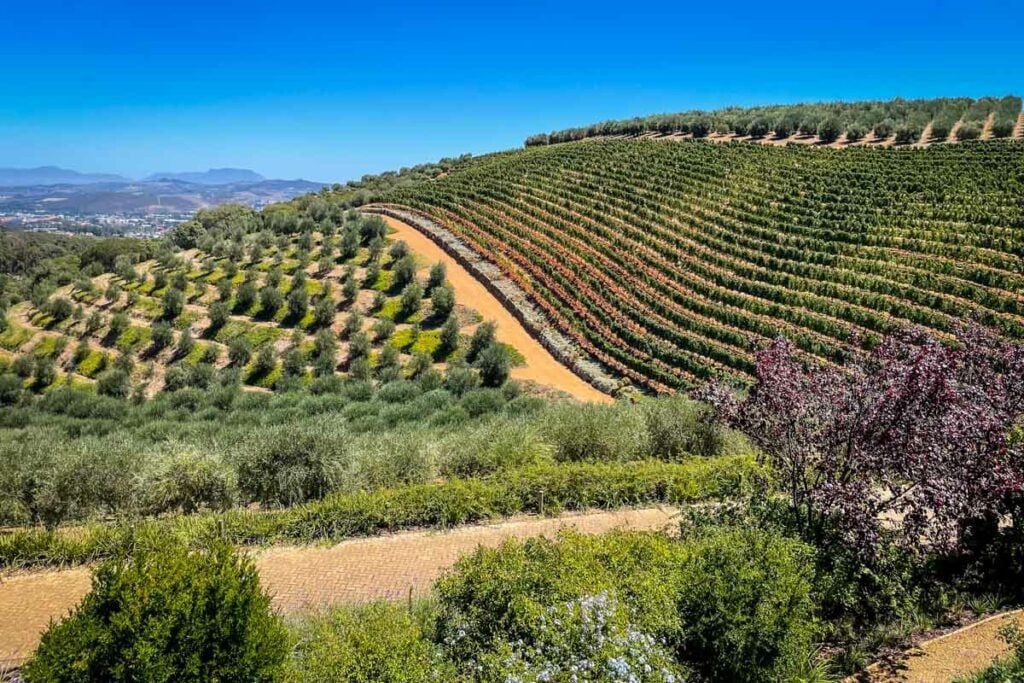
- Cape Winelands
- Great Karoo
- Agulhas National Park
- Eastern Cape – malaria free bush viewing
- Durban
Best things to do during fall in South Africa
- Afrika Burn (between May or June)
- Cape Winelands Festival – for peak harvest
- Go surfing along the coast
- Diving with sharks
Fall is the best season to visit South Africa if…
- … you want comfortable temperatures for outdoor adventures
- … you want more affordable prices
- … you like to avoid crowds
- … you’re into wine tasting and want to visit vineyards
- … you want the best waves for surfing
What to pack for fall in South Africa:
- rain and windproof jacket
- a scarf
- thermal layers
- warm socks
- walking/hiking shoes
Winter in South Africa
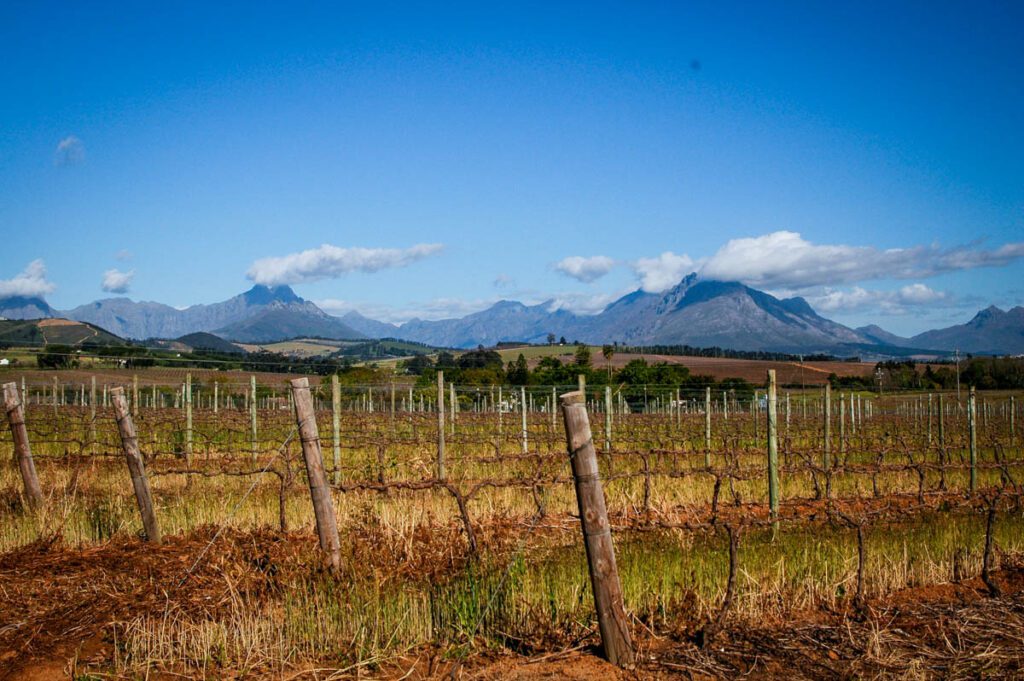
Snow dusts the mountains, migrating whales make their way to the coasts, and carpets of wildflowers in Northern Cape and Namaqualand bloom.
While the winters are technically cold, they’re still pretty mild from the warm fronts from the Indian Ocean, so you can still do a bit of exploring this season, but bring layers.
Reserves in the north are bone dry and offer more favorable temperatures than the scorching summers. Not only does this give you more favorable weather for open-safari, but better odds of seeing wildlife.
- Kruger & reserves: Pleasant temperatures from 10°C/50°F in the morning and 26°C/79°F in the afternoon; rain is extremely rare
- Cape Town & coasts: Mornings begin at 8°C/46°F and peak in the afternoon around 18°C/64°F; regular rainfall and cloudy skies are common
Winter months at a glance:
June brings cooler temperatures, good chances of rain, and great safari conditions. Be mindful of potential fires in the Cape Winelands.
July is in the middle of South Africa’s low season. Warm and dry conditions can be found in the northern areas, but the Cape can be cool and drizzly. Game viewing in the bush is prime, but pack layers since the mornings will be chilly.
August brings peak wildflowers across the Cape as spring rolls in. The KwaZulu-Natal region is a warm escape from Cape Town this month. Early in the month, the cable car to Table Mountain is closed for maintenance.
Best places to visit during winter in South Africa
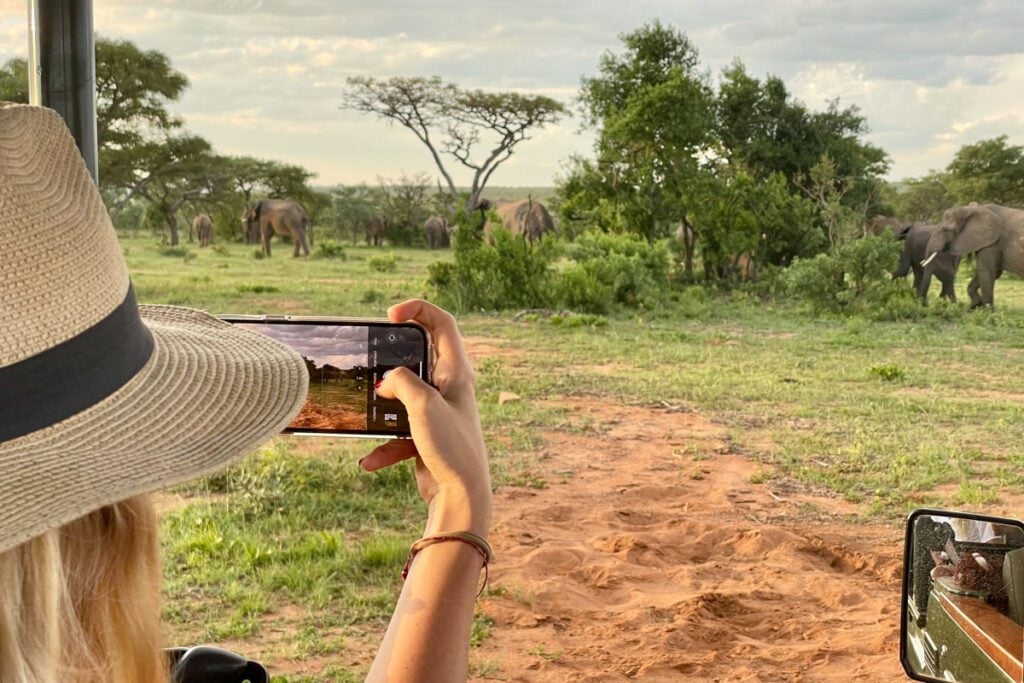
- Kruger National Park – for prime safari viewing
- Namaqualand Flower Route
- Afriski Mountain Retreat – for skiing and snowboarding
- Blyde River Canyon – hiking
Best things to do during winter in South Africa
- Watch the J-Bay Open international surf competition
- Drive the Panorama Route
- Go on safari
- KwaZulu Natal sardine run – largest in the world
Winter is the best season to visit South Africa if…
- … you want the best possible safari conditions
- … you don’t mind colder weather
- … you are okay with afternoon showers
- … you want to avoid crowds on the coast
- … you want to ski or snowboard
What to pack for winter in South Africa:
- warm layers (versatile jacket, gloves and a hat)
- warm and comfortable shoes
- wool socks
- binoculars (if needed for safari)
- ski gear (if needed)
Spring in South Africa

During the Spring, South Africa begins to bloom, the days are heating up, and people are gearing up for all the exciting summer festivals.
Although it’s not the absolute peak season in the bush, it’s still a great time for safari since it’s not quite the wet season and you have the opportunity to spot all the baby animals born in the spring.
September is a peak month for whale watching tours when migration numbers are at their peak. They’re most famously spotted in Hermanus during their whale festival.
- Kruger & reserves: 14°C/57°F in the morning to 31°C/88°F in the afternoon; rain showers gradually increase through November
- Cape Town & coasts: Cooler mornings and mild afternoons 19-24°C (66 – 75°F); mostly sunny days with sporadic rain
Spring months at a glance:
September boasts the beginning of wildflower season on the West Coast. Safari in the bush and whale watching are also near peak during this month.
October is when temperatures start to heat up, but rain is still yet to come. You’ll avoid much of the summer crowds but be mindful of the 10-day school holiday from late September to early October.
November starts to bring rain and late-afternoon storms to the bush. Wildflowers peak in Drakensberg and inland areas are at ideal temperatures.
Best places to visit during spring in South Africa
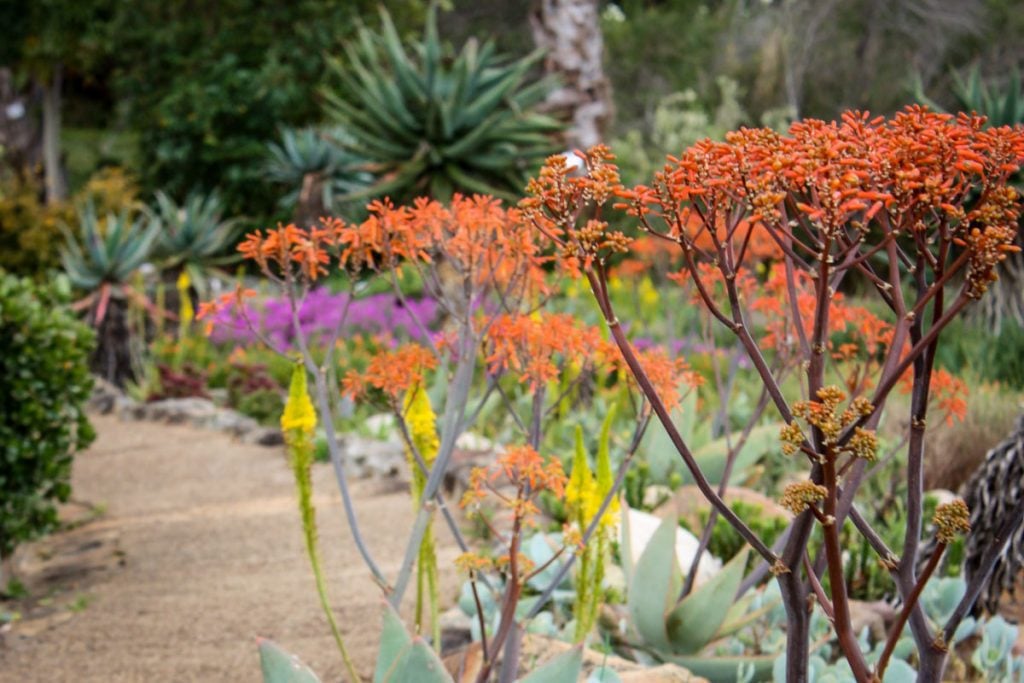
- Hermanus – one of the world’s best whale watching destinations
- Drakensberg Mountains – amazing wildflower blooms
- Kirstenbosch National Botanical Garden (October)
- Cape Town
Best things to do during spring in South Africa
- Rockin’ the Daisies Festival (October)
- Winelands Chocolate Festival (September)
- Take to the beaches
- Hike up Table Mountain
- Hermanus Whale Festival (September)
Spring is the best season to visit South Africa if…
- … you want to immerse yourself in wildlife
- … you want to see wildflowers in bloom
- … you want comfortable temperatures
- … you don’t mind more unpredictable weather as the seasons change
What to pack for spring in South Africa:
- comfortable walking shoes
- rain gear
- warm outer layers
- a scarf
Best time to visit South Africa in our opinion…
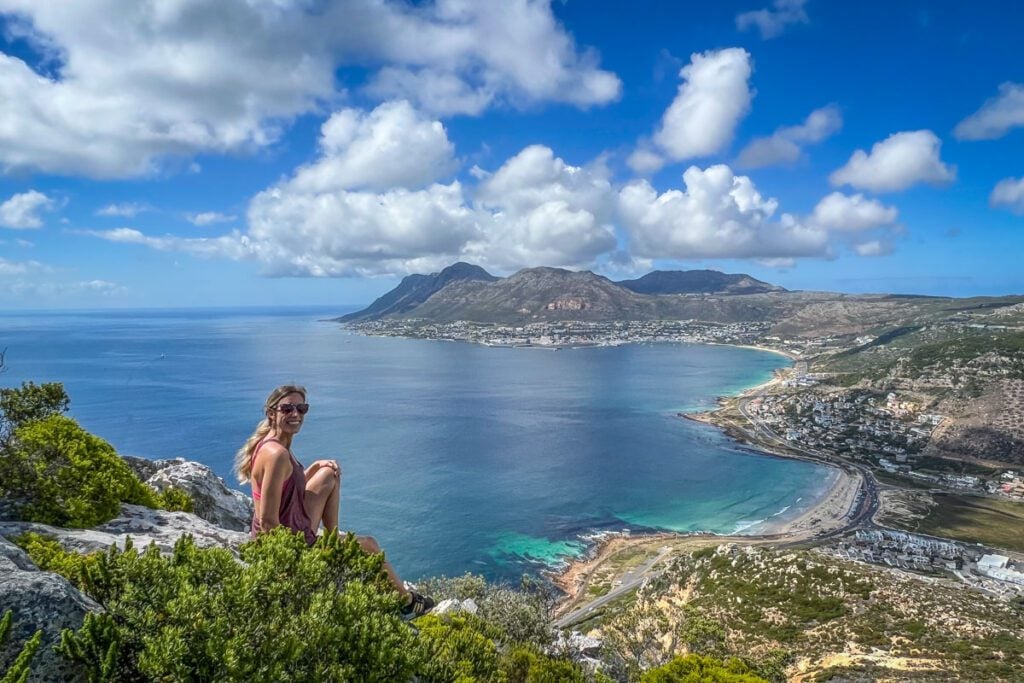
In our opinion, the best time to visit South Africa depends on what you prefer to do.
If hiking and exploring nature is your goal, shoot for March, April or September and October, as you’ll have the best chance of avoiding rain and prime shoulder season weather.
Safari and other wildlife tours are best experienced during the winters from May through September since they have lowest chances of rain. These months offer the best chances of game viewing in the bush and the peak of whale watching season.
For beachgoers, December through February are the best times to visit the coastlines, whereas you may want to avoid June through August, when afternoon showers are common.
To avoid crowds, we recommend you avoid visiting in December & January. Instead choose the shoulder months to still get summer weather, but avoid loads of tourists.
Plan your trip to South Africa
We have TONS of resources on travel in South Africa and how to make the most out of your trip. Check out our South Africa Homepage for all the answers to your most popular questions, or read some of our favorite articles below.
- Start by reading up on the best time to visit South Africa.
- Check out all of our top recommendations for things to do in Cape Town.
- If it’s your first time visiting, this ultimate Cape Town travel guide is just for you!
- Save this list of cool Cape Town Airbnbs for when you’re ready to book your accommodation.
- These are the best day trips from Cape Town you should put on your itinerary.
- Sneak a peak at the best wine farms in Stellenbosch and the Cape winelands to plan a day of tastings!
- Read this before you book the Franschhoek Wine Tram—the best way to visit the Cape winelands!
- Plan your Garden Route road trip with our excellent guide.
- If you’re planning on visiting a game reserve, make sure you know what to wear on safari (+ what NOT to wear!).
Don’t miss your chance to grab our custom Cape Town map!
Get our Custom Cape Town Map sent straight to your phone! We loaded this map with all our favorite restaurants, hidden gems, sights and activities, so you can make the most of your time in the Mother City.
Just enter your email and we’ll immediately send you access instructions!
Save this article on Pinterest for later!


We want to hear from you!
What season sounds like the best time to visit South Africa to you? Why? Do you have any more questions after reading this article? Leave your comments below and we’ll try our best to bet back to you!

